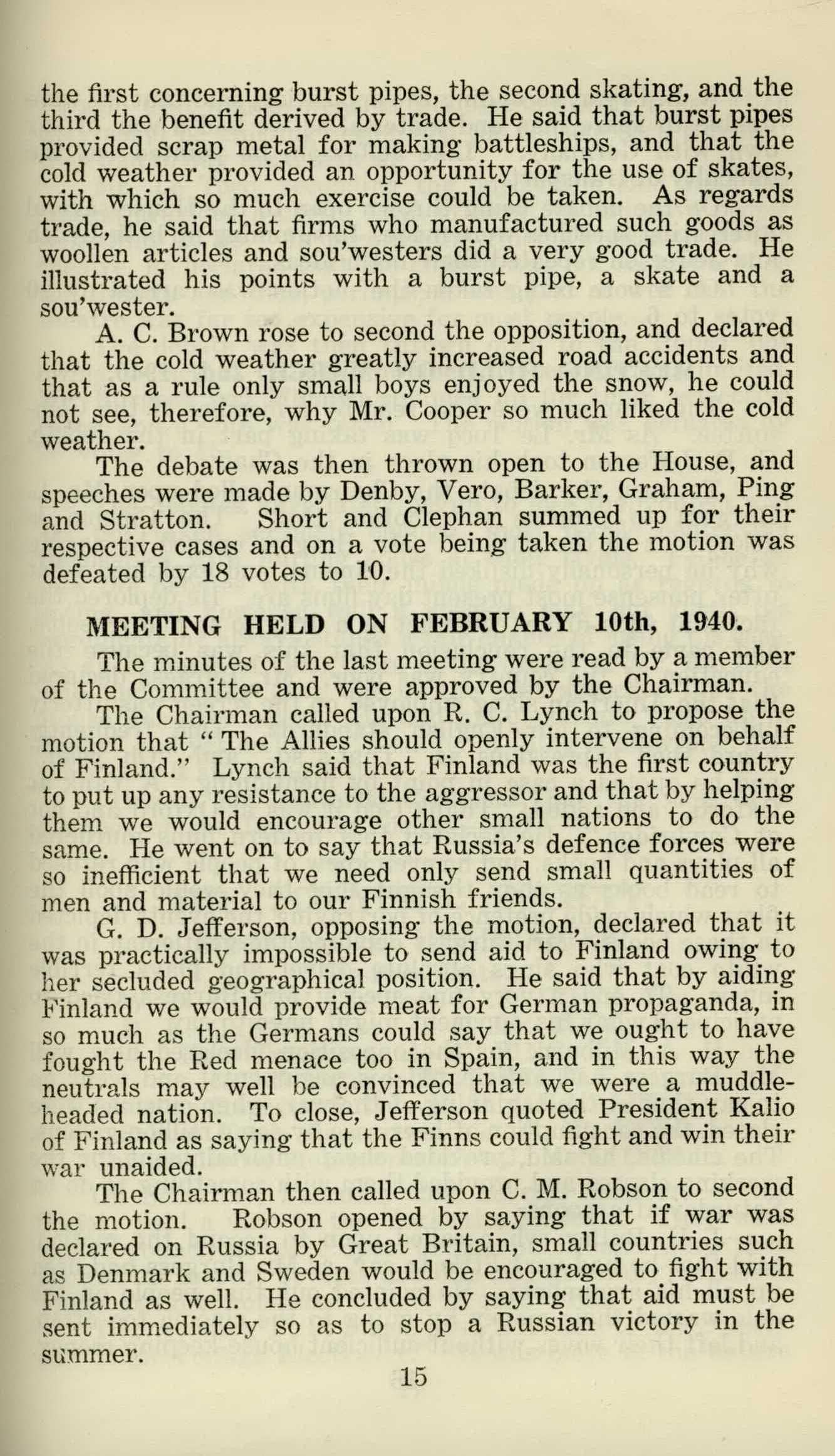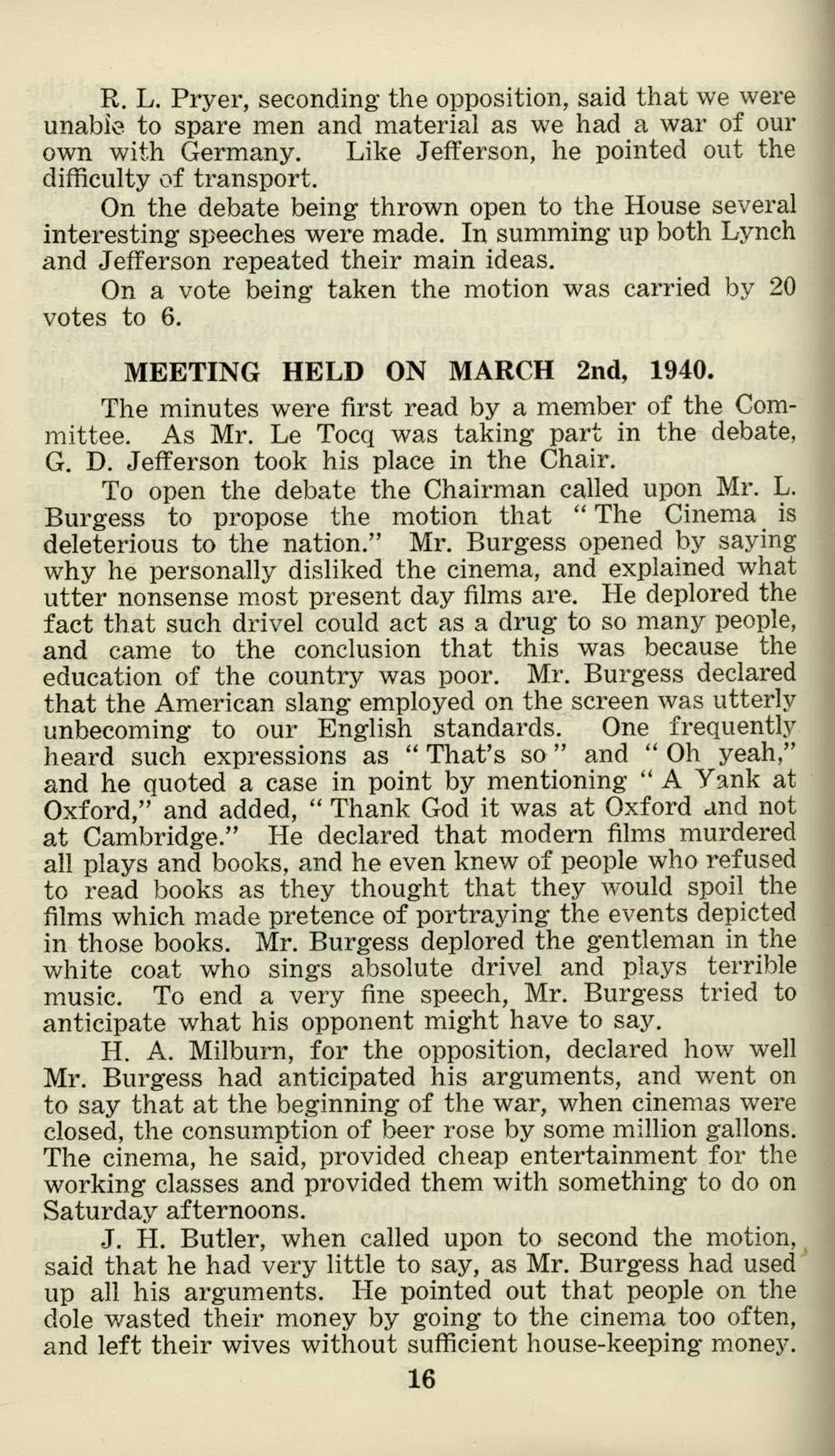
6 minute read
The Debating Society
from April 1940
by StPetersYork
Temple was defeated in the semi-final of the Junior House Hockey, and also in the senior match. However, the teams were very young, and their enthusiasm and determination promise well for future years.
We wish to congratulate R. C. Lynch on his appointment to be Captain of Hockey.
In the semi-final of the First Division Boating, Temple lost to School House by two lengths. We wish to congratulate School House on their magnificent but unsuccessful attempt against the Rise in the final of this event.
Owing to the curtailment of the term, Standards and the Athletic Sports had to be abandoned. This was a dis appointment, as all members of the House had been training hard, and we had hoped to retain the Sports Shield.
However, the term has been by no means an unsuccessful one, and we hope that all members of Temple House will return after the holidays to pursue the many activities of the Summer Term with renewed vigour.
President : THE HEADMASTER. Chairman : L. C. LE TOCQ, Esq. Committee :
J. H. BUTLER, C. M. ROBSON, H. A. MILBURN, G. D. JEFFERSON.
The first meeting of the Society this term was held on Saturday, January 27th, 1940. To open the meeting, G. D. Jefferson asked if the votes of censure which had been passed on the Committee at various times could be raised, but his request was not granted.
The Chairman called upon A. A. Short to propose the motion that " It is desirable that periods of cold weather should continue." Short's first point was that snow-fights relieved the monotonous routine of school life, as he knew from personal experience. As regards the war, Short stated that the cold weather froze the Danube and thus prevented Roumanian supplies from reaching Germany, and it provided tremendous aid for the Finns in their struggle against Russia.
A. S. Clephan, opposing the motion, declared that Short's speech was absolutely lacking in truth. He pointed out that the snow was a public nuisance and that snowfights often resulted in the participants having influenza if they failed to change into dry clothes after them.
J. S. Cooper, Esq., called upon by the Chairman to second the motion, divided his speech into three sections, 14
the first concerning burst pipes, the second skating, and the third the benefit derived by trade. He said that burst pipes provided scrap metal for making battleships, and that the cold weather provided an opportunity for the use of skates, with which so much exercise could be taken. As regards trade, he said that firms who manufactured such goods as woollen articles and sou'westers did a very good trade. He illustrated his points with a burst pipe, a skate and a sou'wester.
A. C. Brown rose to second the opposition, and declared that the cold weather greatly increased road accidents and that as a rule only small boys enjoyed the snow, he could not see, therefore, why Mr. Cooper so much liked the cold weather.
The debate was then thrown open to the House, and speeches were made by Denby, Vero, Barker, Graham, Ping and Stratton. Short and Clephan summed up for their respective cases and on a vote being taken the motion was defeated by 18 votes to 10.
MEETING HELD ON FEBRUARY 10th, 1940.
The minutes of the last meeting were read by a member of the Committee and were approved by the Chairman.
The Chairman called upon R. C. Lynch to propose the motion that " The Allies should openly intervene on behalf of Finland." Lynch said that Finland was the first country to put up any resistance to the aggressor and that by helping them we would encourage other small nations to do the same. He went on to say that Russia's defence forces were so inefficient that we need only send small quantities of men and material to our Finnish friends.
G. D. Jefferson, opposing the motion, declared that it was practically impossible to send aid to Finland owing to her secluded geographical position. He said that by aiding Finland we would provide meat for German propaganda, in so much as the Germans could say that we ought to have fought the Red menace too in Spain, and in this way the neutrals may well be convinced that we were a muddleheaded nation. To close, Jefferson quoted President Kalio of Finland as saying that the Finns could fight and win their war unaided.
The Chairman then called upon C. M. Robson to second the motion. Robson opened by saying that if war was declared on Russia by Great Britain, small countries such as Denmark and Sweden would be encouraged to fight with Finland as well. He concluded by saying that aid must be sent immediately so as to stop a Russian victory in the summer.

R. L. Pryer, seconding the opposition, said that we were unable to spare men and material as we had a war of our own with Germany. Like Jefferson, he pointed out the difficulty of transport.
On the debate being thrown open to the House several interesting speeches were made. In summing up both Lynch and Jefferson repeated their main ideas.
On a vote being taken the motion was carried by 20 votes to 6.
MEETING HELD ON MARCH 2nd, 1940.
The minutes were first read by a member of the Committee. As Mr. Le Tocq was taking part in the debate, G. D. Jefferson took his place in the Chair.
To open the debate the Chairman called upon Mr. L. Burgess to propose the motion that " The Cinema is deleterious to the nation." Mr. Burgess opened by saying why he personally disliked the cinema, and explained what utter nonsense most present day films are. He deplored the fact that such drivel could act as a drug to so many people, and came to the conclusion that this was because the education of the country was poor. Mr. Burgess declared that the American slang employed on the screen was utterly unbecoming to our English standards. One frequently heard such expressions as " That's so " and " Oh yeah," and he quoted a case in point by mentioning " A Yank at Oxford," and added, " Thank God it was at Oxford and not at Cambridge." He declared that modern films murdered all plays and books, and he even knew of people who refused to read books as they thought that they would spoil the films which made pretence of portraying the events depicted in those books. Mr. Burgess deplored the gentleman in the white coat who sings absolute drivel and plays terrible music. To end a very fine speech, Mr. Burgess tried to anticipate what his opponent might have to say.
H. A. Milburn, for the opposition, declared how well Mr. Burgess had anticipated his arguments, and went on to say that at the beginning of the war, when cinemas were closed, the consumption of beer rose by some million gallons. The cinema, he said, provided cheap entertainment for the working classes and provided them with something to do on Saturday afternoons.
J. H. Butler, when called upon to second the motion, said that he had very little to say, as Mr. Burgess had used' up all his arguments. He pointed out that people on the dole wasted their money by going to the cinema too often, and left their wives without sufficient house-keeping money.
16











